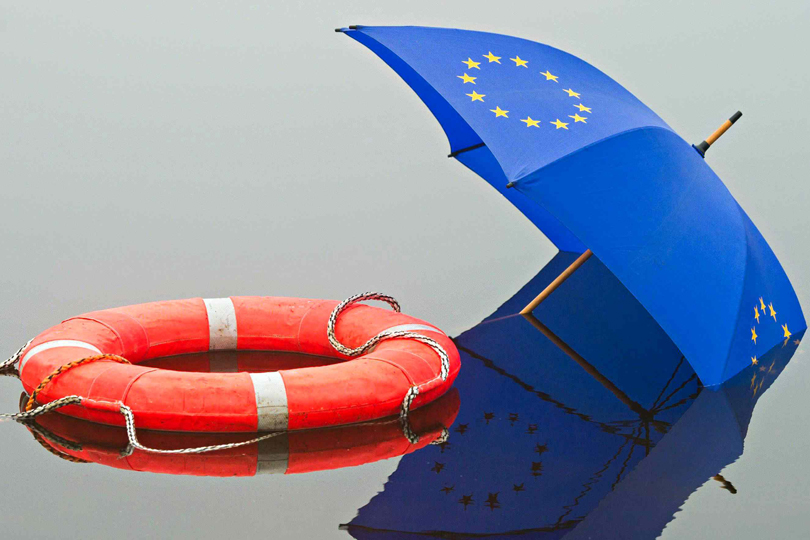HERMAN VAN ROMPUY, JANIS A. EMMANOUILIDIS, FABIAN ZULEEG
The eurozone crisis is far less dangerous now than during its peak years of 2010-2013. Growth has picked up across the European Union, and five million jobs were created between 2014 and 2017.
But the EU banking union remains incomplete, Greece and the Italian banking sector are facing challenges, and the aftershocks of the euro crisis could still undermine the EU’s stability – or even threaten the common currency.
Barring the worst-case scenario of populist victories in the French election this May and the German election this September, European leaders should seize the opportunity later this year to pursue more ambitious, but pragmatic, reforms.
As a first step, policymakers will need to acknowledge that they still lack effective policy-coordination tools. Although the European Semester created a broad framework for coordination, it has failed to effectively improve competitiveness, growth, or employment across all EU countries. At the same time, investment remains too low throughout the eurozone, and especially in countries that need to stage the largest recoveries. The “Juncker Plan” for targeted EU-wide investments can be a part of the solution, but it will not be enough.
To be sure, these economic problems will require solutions at the national level; but they have also been perpetuated by common policymaking failures. For example, approved eurozone reforms have been implemented far too slowly; and additional structural reforms are not in the pipeline.
There is also significant policy divergence among EU member states, because some do not trust others to fulfill their individual obligations. One camp, led by Germany and the Netherlands, believes that national governments are obliged, first and foremost, to deliver on agreed reforms, while respecting commonly agreed rules. France and Southern European countries, by contrast, argue that governments need more flexibility to decide on fiscal and structural reforms, and that governments with greater fiscal leeway should help to address current imbalances by increasing their public expenditures.
Because national governments are politically accountable to their own citizens, they often lack incentive to increase cooperation at the EU level. This disconnect is now hampering further Economic and Monetary Union (EMU) reforms. Following up on its recent White Paper on the Future of Europe, the European Commission, for its part, intends to offer additional proposals for EMU reform in the first half of 2017. One hopes that it will furnish an ambitious agenda. It is clear that the eurozone will need far better coordination to ensure its long-term sustainability.
Toward that end, European leaders need to take a pragmatic first step to rebuild the trust needed for more substantial policy innovations in the future. The initiative must come from France and Germany, the monetary union’s two largest economies, while also involving other euro countries. After their elections this year, France and Germany should issue a joint proposal that reflects concerns about collective responsibility, individual flexibility, and EU solidarity.
For starters, a Franco-German proposal should allow for more fiscal flexibility, but within a strict framework. The EMU should have a “golden rule” for public and social investment, with a clear definition of such projects and a mechanism for assessing their validity. In exchange for greater flexibility on public and social spending, fiscal rules should be applied more strictly to all remaining expenditures, and should include the use of sanctions when necessary.
Second, the proposal should call for contractual reform-and-investment agreements (RIAs) between individual member states and the European Council, approved by national parliaments and based on country-specific recommendations that are agreed to as part of the European Semester. This initiative would acknowledge that boosting growth requires investment, but that funding should be conditioned on demonstrated action. RIAs would instill discipline alongside solidarity, by focusing on reforms yielding a high growth dividend that will benefit all eurozone countries.
Finally, fiscal capacity will be needed to underpin RIAs with eurozone countries that lack the budgetary space to spur growth on their own. The European Stability Mechanism could potentially provide such funds, starting with a limited amount and expanding the scope if the initiative is successful.
A Franco-German reform package that includes these proposals would improve eurozone economic and policy convergence and cohesiveness. With a stronger EMU, the EU could remain open, while also providing more protection for its citizens. Moreover, this plan leaves significant decision-making power at the national level – even as it encourages intra-eurozone cooperation – and builds on existing governance provisions.
This plan would constitute a substantive first step toward more fundamental reforms at a later time. But it will depend on favorable, pro-European election outcomes in France and Germany, and on European leaders’ willingness to compromise and take calculated short-term risks.
Shoring up the project of European integration will require a comprehensive political deal. But European leaders must not miss their upcoming chance to start putting integration back on track. Otherwise, the eurozone’s current weaknesses will undermine the sustainability of the EMU itself, by generating uncontrollable costs that all EU countries will have to pay.







Comments